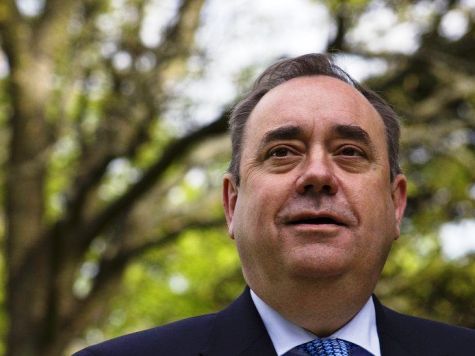With Scotland’s referendum on whether to leave the UK and become an independent country drawing ever closer, scrutiny of First Minister Alex Salmond’s economic plan is becoming more and more heated.
Below is an article by Jim Edwards for Business Insider that demonstrates just how difficult it will be for Scotland to manage its finances if it chooses to go it alone. With less than two months left, Salmond has to demonstrate he can overcome these problems – if not, independence could be on course for defeat.
Scotland will vote in a referendum on whether it will become independent from Britain on September 18, and it’s becoming increasingly clear that if by some miracle the Scots do choose independence, then the new nation of Scotland will be in imminent peril of economic collapse.
And there is one very simple reason why: An independent Scotland will not be allowed to use the British pound sterling as its currency, a British parliamentary committee has recommended, and Scotland isn’t big enough economically to support its own currency.
Let’s begin by putting an independent Scotland in perspective, in terms of its population size:
- Britain: 63 million
- Scotland: 5.3 million
- London: 8.3 million
Scotland might look big on the map, but in terms of the actual number of people involved it’s small fry. An independent London city state would make more sense as a “country” than Scotland, ranked by population alone.
Pick a currency, any currency — they’re all bad.
Scotland has four “options” for a currency if it goes independent, according to this House of Commons report:
- using the pound in a currency union with Britain.
- using the pound without Britain’s permission (“sterlingisation”), the way Panama uses the U.S. dollar.
- adopting the Euro.
- creating a new Scottish currency (which we can only hope they would call “the groat” or “the Jock.”)
Using the pound or the Euro in any way would keep Scotland at the mercy of central banks it does not control. As a small country, that’s not desirable. Scotland would not be able to devalue its currency in order to increase exports or strengthen it in order to ward off inflation. (Think about Greece.)
Scotland will not get the pound.
And George Osborne, the U.K’s chancellor of the exchequer, has categorically ruled that if Scotland leaves it’s on its own. The new country will not have recourse to the Bank of England when the going gets tough. That House of Commons report said:
The Chancellor of the Exchequer told us: “… ultimately you would be asking UK taxpayers to provide a safety net to a separate country, which, by the way, has a very large banking system and a much smaller economy. It would be like sharing the bank account and credit card after a divorce.”
“I do not think that it would be in the interests of the people of Scotland either, because they would be tying themselves to the economic decisions of another country; the interest rate decisions of a Bank of England that they were not involved with anymore; and the tax and spend decisions of this Parliament, where there would not be Scottish Members of Parliament representing their interests.”
Now let’s assume you’re a hardcore Scottish nationalist and you want independence regardless of the currency consequences. Your position is, “damn the torpedoes!” essentially.
Scotland can’t back its banks.
It turns out that Scottish gross domestic product (GDP) is so small its deficit is twice that of the U.K. as a whole. According to Fathom Consulting, Scotland had a budget deficit of 13.3% of GDP in 2012-13, the U.K.’s was 7.3%.
And, Fathom says, Scotland’s GDP is the equivalent of only one tenth of the assets in its banks. That’s crucial because in theory, a country’s banking system only remains stable if people believe that the country will stand behind, or make good, on all the assets held in its banks. (For instance, the FDIC guarantees U.S. deposits even if an individual bank goes bankrupt.) Scotland can’t do that, Fathom says. Here’s Sunday Times columnist David Smith’s summary of that:
Fathom estimates it would still be as fragile as Greece, not because its budget deficits are a bit larger than the whole UK’s, but because it would carry too much banking risk.
As things stand, Scotland’s banking assets — in practice the potential liabilities of an independent Scottish government in the event of independence — are a staggering 1,100% of GDP. Scotland has a potential banking liability of Icelandic proportions, much bigger than those (700% of GDP) that almost bankrupted the Irish economy.
S&P has warned that this raises ratings risks for Scottish banks.
“While S&P has said that Scotland could start with an investment grade rating, the rating agency would be concerned about high levels of public debt, sensitivity to oil prices, depending on the nature of arrangements with the EU or UK, potentially limited monetary flexibility, and volatility from the banking sector,” according to Chintan Joshi at Nomura. “These concerns would have a bearing on funding costs of Scottish banks and would therefore be a longer-term risk to shareholders.”
And if things did sour, Scotland’s financial services industry couldn’t count on the Bank of England as a lender of last resort.
It’s interesting that when economists talk about an independent Scotland, the countries they compare it to are not England or France. They’re Greece, Iceland and Ireland — the economic basket cases of Europe.
So, what is a nationalist to do? Nothing, apparently. Scottish National Party leader Alex Salmond has no Plan B for a Scottish currency.

COMMENTS
Please let us know if you're having issues with commenting.